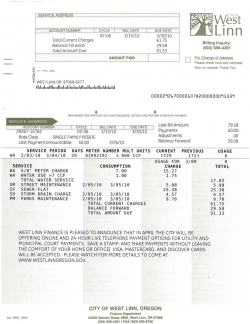Understanding your City Services Bill
The City of West Linn provides a full range of municipal services to the community, which includes police protection, traffic control and improvement, street maintenance and improvement, water, sewer, and surface water management services, planning and zoning regulation, building inspection and regulation, parks and recreational facilities and activities, and community library services.
Understanding City Services and Your Monthly Charges
Water Charges
It is the Utility Advisory Board and the City of West Linn’s goal to provide the citizens of West Linn with a safe and dependable supply of drinking water, assure quantities are available as needed, and provide uninterrupted service to all customers while maintaining fire flow reserves on a continuous basis. The City purchases water from South Fork Water Board, a wholesale water provider to the cities of Oregon City and West Linn. The City of West Linn’s water rate structure is as follows: consumption up to the first 7 CCF (5,236 gallons) is included in the fixed base monthly rate, and each CCF used over 7, is an additional charge.
Water rates typically adjust each January 1, up to a maximum of 5% without a vote, to maintain the quality level of water service, while keeping up with inflation.
Learn more: http://westlinnoregon.gov/publicworks/water
Sewer Charges
The City provides safe, efficient, and cost-effective operation of the sewer system, while protecting from health hazards, flooding, property damage, and environmental damage, meeting legal requirements, protecting environmental standards, and the health of the citizens of West Linn.
Tri-City Service District is the separate entity that treats City of West Linn sewage and accordingly, the City passes through their charges to West Linn citizens. These pass-through charges are not determined by the City, but rather by the Tri-City Service District and historically have changed every July 1.
Learn more: http://westlinnoregon.gov/publicworks/sanitary-sewer
Storm Drain Charges - Surface Water Management
The City provides removal of pollutant loads from street/gutter systems to avoid storm-water contamination, meet community objectives for clean streets and keep streams, wetlands, and waterways clean.
The Surface Water Management Fee typically adjusts January 1 of each year, to sufficiently keep up with inflating costs of managing the City’s surface water needs.
Learn more: http://westlinnoregon.gov/publicworks/stormwater
Street Maintenance Fee (Roadway Maintenance)
A stable and sufficient source of revenue is needed to ensure that West Linn can continue to maintain and improve the quality of its existing public street system; to provide a safe street system, properly maintain the street system and areas to maximize their use, utility, and longevity, and maintain certain landscaped areas within the street rights-of-way.
This Street Maintenance Fee typically adjusts every July 1, and has been 5% in recent years, to sufficiently keep up with inflation.
Learn more: http://westlinnoregon.gov/finance/street-maintenance-fee-faq
Parks Maintenance Fee
The Parks Maintenance Fee provides timely maintenance to the City’s park assets protects the City's investment in parks, and makes it possible for these assets to be used by residents. Plus, routine maintenance is important if we want to keep using our parks and ensure that lawns are mowed, paths are maintained, restrooms are cleaned, and playing fields are accessible, among other tasks. Deferring maintenance on parks can cost more in the long-run.
The Parks Maintenance Fee typically adjusts every July 1, and has recently been 5% annually, to sufficiently keep up with inflating park maintenance costs.
Learn more: http://westlinnoregon.gov/finance/parks-maintenance-fee
How are the rate increases determined?
Utility rate increase considerations follow two committee paths before Council considers adoption. First, the Utility Advisory Board reviews long-range funding needs of each utility all year long. After monthly meetings, which are televised, they periodically submit recommendations for Council to consider.
Second, the Citizens’ Budget Committee reviews budgets and determines any necessary rate changes needed in order to balance each respective utility fund. This balancing process, and any rate change needed for this to occur, considers projected revenue streams, inflating operating costs, and need for capital funding. These budget meetings are also televised and are held periodically throughout the year, as well as formally every other spring during the budget adoption process.
The citizens of West Linn did pass a Charter provision, providing for a 5% maximum increase without a vote. This provision relates to water, sewer and surface water fees and excludes the Tri-City Sewer district pass through fee. This Charter provision is as follows:
Municipal Code, Section 44. Voter Approval of Utility Rates. No "utility rate increase" may exceed 5% in any calendar year without first receiving voter approval. The City Council may increase utility rates by a percentage of no more than 5% in any calendar year after having considered a recommendation from the Utility Advisory Board for the percentage increase, if one is received. For the purposes of this section a "utility rate increase" is the cost increase paid to the City by a user of the sanitary sewer, storm sewer and water systems above the rate paid on June 18, 1999, excluding the component of a sewer rate increase that is a pass through of an increase in charges paid by the City for sewage treatment. The utility rate for each system shall be considered separately. The provisions of this section shall be implemented by ordinance of the Council.
Learn more: http://westlinnoregon.gov/finance/history-water-west-linn
The Master Fees Schedule consolidates all City fees and charges, adopted by City Council resolution, for the various services that the City provides.
Learn more: http://westlinnoregon.gov/finance/fees-and-charges

